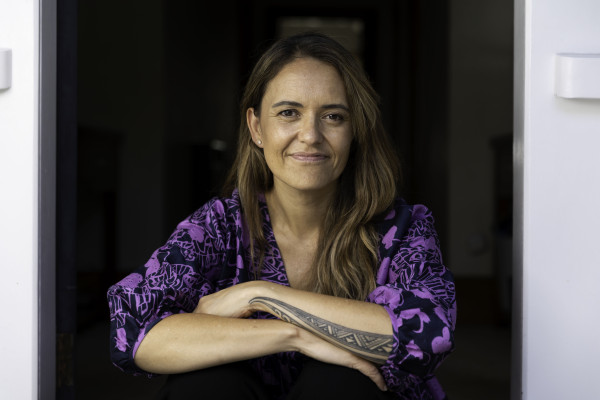Racism has a negative impact on the health and wellbeing of rangatahi in Aotearoa, a study funded by the Health Research Council of New Zealand has found.
“R4A: Revealing the Realities of Racism for Rangatahi in Aotearoa” is a project that analyses data over a 15-year period to show how racism affects the health of young people aged 15-24 in New Zealand.
It’s the first study of its kind to look at the link between racism and health for this age group.
Māori health academic Sarah-Jane Paine (Tūhoe, Ngāti Rongo) is the lead researcher and says the study found that in order to achieve health equity in Aotearoa, policies need to first target racism as a cause for inequity.

Sarah-Jane Paine is a Māori health academic from Te Kupenga Hauora Māori, Faculty of Medical and Health Sciences, University of Auckland. Image: supplied.
What did the study find?
The study found Māori, Pacific and Asian rangatahi reported a higher prevalence of racism than their European counterparts.
It did this by analysing Government data across a 15-year timespan to collect information about racism, discrimination, health and wellbeing.
Higher reporting of racism came from men aged 20-24, who were either Māori, Pacific or Asian and who lived in the most deprived neighbourhoods in New Zealand.
The study found experiencing racism is “a breach of their health rights and, for rangatahi Māori, it is a breach of their Indigenous rights”.
Paine referred to the UN Declaration on the Rights of Indigenous Peoples, which protects indigenous people’s rights to their culture, identity and health, saying they “should be free from discrimination of any kind”.
“Racism is a human rights issue”, not just a health and wellbeing issue, she says.
How does racism impact health and wellbeing?
The study found experiencing racism was connected with higher levels of poor health.
That included reporting stress, negative mental health, negative physical health and a higher unmet need for primary healthcare.
Paine says racism also indirectly impacts health because societal systems and structures are set up in ways that disadvantage indigenous and ethnic minorities.
Experiencing racism was associated with feeling like you didn’t belong in New Zealand, being less able to express your identity and reporting negative life satisfaction, all of which negatively impacted wellbeing.
How does racism specifically impact young people?
The R4A study was a collaboration between university-based researchers and a rangatahi partnership group of young Māori who are involved in youth advocacy and community work.
Paine says the group told her that, alongside mental health, racism affects their identity by putting them in boxes.
She says these young people may all be Māori but their experiences are diverse and their identities are complex, like having different iwi and different schooling experiences.
Racism can make rangatahi Māori feel limited and not a positive contributor to society, Paine says.
“We're talking about young people in relation to ram raids, in relation to crime and [in] relation to the justice system. We're not celebrating young people in relation to their strengths, their resilience,” she says.
Racism can make it so expressing your identity as rangatahi Māori isn't always safe, she says.
What might anti-racism strategies look like?
Paine says understanding that racism is a fundamental cause of poor health can help researchers think of solutions for health-based issues.
For example, if researchers found young people were hesitant to visit doctors, they might design solutions to educate them about why they should see a doctor, she says.
Paine says educational strategies are not the only answer and that “we need strategies that address the racism that is causing harm to the mental and physical wellbeing”.
She says it’s crucial to support young people who want to be involved in anti-racism work and work collaboratively with them to figure out what’s important to them.
Other young people “just wanna crack on with the things that are important to them” whether that’s climate action, education, kapa haka or other kaupapa, she says.
Paine says investing in those rangatahi as leaders of their communities is also a form of anti-racism work.
“But we also need to recognise that young people have their own dreams. They've got their own goals for Aotearoa,” Paine says.
She says “talking about racism in itself creates some harm” for some rangatahi so it’s important to remember they might prefer celebrating themselves instead of fighting structural racism.
“Let's also invest in that because when we enable young people to live out those dreams, we're also practising some level of anti-racism.”
Where to get help:
- 1737: The nationwide, 24/7 mental health support line. Call or text 1737 to speak to a trained counsellor.
- Youthline: Free call 0800 376 633, free text 234. Nationwide service focused on supporting young people.
More stories:
'God will send gay people to hell’: Surviving spiritual abuse
Conversion practices were banned two years ago, but survivors say more needs to be done.
'Sucked into the trap': How social media can impact body image
New research shows young people know social media can negatively shape the way they see themselves.
What it’s like to be a Māori midwife
"We’re the ones who represent the statistics, so we need our workforce to grow.”